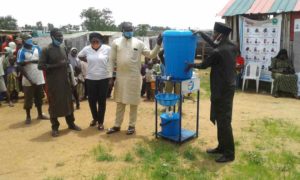WASH practitioners stand on the frontline of Nigeria’s COVID-19 response
July 16, 2020
By: Olajide Adelana
This article was originally posted on WSSCC’s website.
ABUJA, Nigeria – The role of water, sanitation and hygiene (WASH) practitioners in Nigeria’s response to the COVID-19 pandemic cannot be overemphasized as working on the front line of the fight against the coronavirus requires both courage and commitment.
Mr Benson Attah, National Coordinator of the Society for Water and Sanitation (NEWSAN) – an umbrella body for civil society organizations (CSOs) working in the WASH sector – is a WASH practitioner, whose commitment has been unwavering in implementing and monitoring Nigeria’s COVID-19 response framework.
 When Mr Attah heard about the number of COVID-19 cases in the country, his first action was to alert NEWSAN’s state chapters to immediately commence community sensitization and ensure compliance with the safety protocols of the World Health Organization and Nigeria Centre for Disease Control (NCDC). With his colleagues at NEWSAN, Mr Attah also created an action plan for the pandemic at various state levels, which became a vital tool for awareness creation and COVID-19 prevention activities at the community level.
When Mr Attah heard about the number of COVID-19 cases in the country, his first action was to alert NEWSAN’s state chapters to immediately commence community sensitization and ensure compliance with the safety protocols of the World Health Organization and Nigeria Centre for Disease Control (NCDC). With his colleagues at NEWSAN, Mr Attah also created an action plan for the pandemic at various state levels, which became a vital tool for awareness creation and COVID-19 prevention activities at the community level.
“The COVID-19 pandemic didn’t come as a surprise and my experience with professional emergency management equipped me for this type of emergency,” he says. “We had thought the N1H1 virus between 2008 and 2009 was going to be a pandemic but it was not. It was just a matter of time.
Nigeria’s coronavirus cases have begun to soar with no less than 29,286 laboratory confirmed cases as of 7 July 2020. Mr Attah states that the ongoing community spread of the disease is concerning, but more worrisome are Nigeria’s hygiene and sanitation statistics.
According to the 2018 WASH Norm Survey findings by Nigeria’s Federal Ministry of Water Resources, only 11 percent of the entire population has access to complete basic water, sanitation and hygiene services. 16 percent of schools have basic water and sanitation services, and 47 million people still practice open defecation.
Mr Attah explains that these statistics expose worrying gaps both in light of COVID-19 safety protocol’s insistence on personal hygiene and Nigeria’s growing population, which is currently estimated at 200 million people.
Also of significant concern is the impact of these statistics on rural and hard-to-reach communities in Nigeria, where the likelihood of misinformation about the disease is high and medical interventions can be challenging.
The pandemic has overstretched Nigeria’s already weak healthcare sector, which suffers from a shortage of manpower and equipment, requiring many to step in as frontline workers to support the fight against the virus. Despite the challenges, Mr Attah, who is a member of Nigeria’s Federal Capital Territory’s COVID-19 task force team, says he is not scared to be on the frontline.
I would not be part of the team if I was scared. I keep myself safe and sane by making sure that I don’t compromise my safety and I religiously follow preventive protocols.
WSSCC has been providing support to the Nigerian government in response to the pandemic by tailoring one of its flagship initiatives, Rural Sanitation and Hygiene Programme in Nigeria (RUSHPIN), and supporting organizations like NEWSAN to address COVID-19 related issues.
RUSHPIN has been effective in breaking down scientific information into graspable formats, and debunking myths concerning COVID-19, sanitation and hygiene in rural and hard to reach areas in Nigeria. Meanwhile, NEWSAN has continued to provide necessary administrative support to the Nigerian government down to the State and Local Government levels.
Coronavirus brings several points of reflection for WASH experts in Nigeria.
“In NEWSAN, we have always regarded WASH as the ‘gateway to development’ as it affects every aspect of development, health, education, economy, labour and productivity. In Nigeria, the WASH sector should be more professional in its set up and outlook,” explains Mr Attah.
“Government across different levels should take immediate responsibility by recognizing the prominent role of the WASH CSOs in ensuring that coronavirus does not spread beyond its present point and, this should be allowed to gradually transit and consolidate into an all-round development that is sustainable.”
